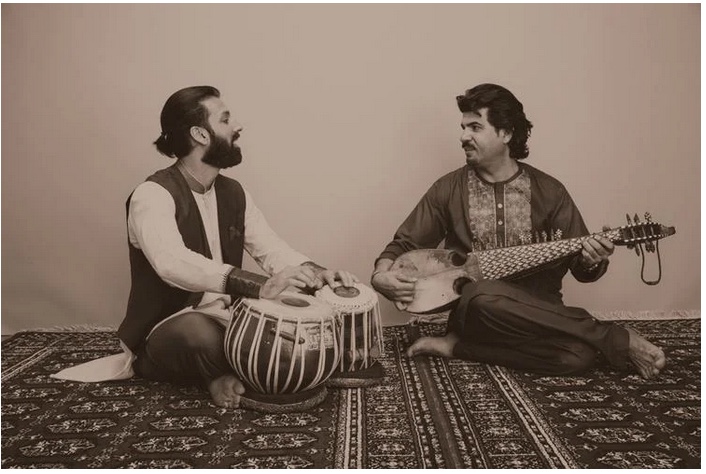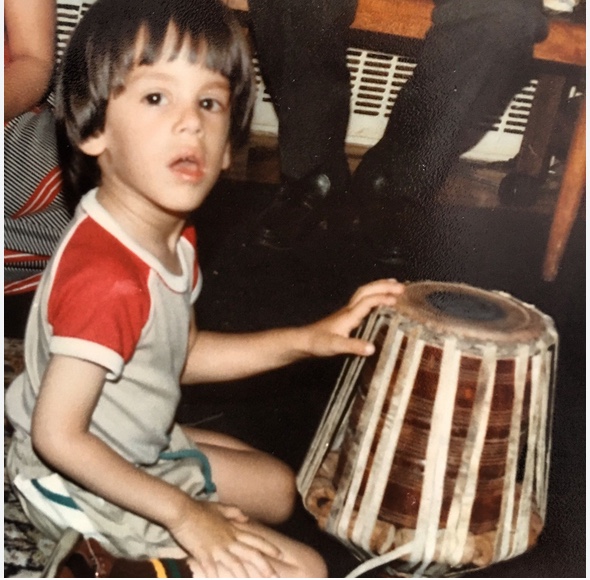by Mike Telin

On Sunday, October 6 at 7:30 pm in Finney Chapel, Salar Nader and rubâb player Homayoun Sakhi will present a program featuring music of their Afghan homeland, pushing artistic boundaries that reflect their country’s position at the confluence of Persian, Central Asian, and Indian cultures. The program also includes Oberlin Conservatory’s Performance and Improvisation (PI) Ensemble, directed by Jamey Haddad.
On Saturday, October 5 at 1:00 pm, Nader and Sakhi will present a public master class in Stull Recital Hall. Click here for more information. Both events are free.
Nader said that Haddad has been a longtime friend and mentor since meeting in the Pyrenees Mountains of Spain in 2007. “DJ Cheb i Sabbah brought us together, and it was like we were long-lost brothers by the time we played the show. Ever since then he has always been so welcoming. The thing that I learned from him and people like Stanley Clark, is that they all have a similar attitude when it comes to welcoming the different musics of the world.”
Nader was also influenced by his teacher, Ustad Zakir Hussain, and his grandmaster teacher, Ustad Alla Rakha. “Between the two of them, Alla Rakha being the partner in crime with Ravi Shankar and the other being the co-founder of Shakti with John McLaughlin, they helped pave the way and open up a lot of doors for what I’ve been doing. It’s a fun conversation because there’s a lot of improvisation that we do in our music.”
Nader and Sakhi look forward to bringing that fun conversation to their Oberlin residency. “We’ll work with students and have some discourse about the different sub-genres within Afghan melodic and rhythmic traditions. And we’ll culminate with a concert that will feature Jamey’s ensemble.”
In the percussion world, the tabla is a relatively young instrument at roughly 200 to 300 years old. The instrument was first used during Sufiyana chants, Vedic chants, and music in temples. Both the Hindu and Islamic traditions used the instrument mostly for spiritual practices.
“It was a rhythmic instrument where you would be reciting and chanting various Shlokas or Sufi Kalam,” Nader said. “My teacher said it was first a spiritual tradition, until the mid-19th century when it was concertized and you had Ravi Shankar and Alla Rakha playing at Woodstock and the music became entertainment. Although we still say this is not meant for entertainment — at the end of the day, that’s what happens although it is a spiritual music that’s being performed.”

Fast forward a few years, Nader and his family resettled in New York, and then in the San Francisco Bay Area. “I was about 7 years old when I noticed a VHS tape with Zakir Hussain performing with John McLaughlin and I said, ‘I want to meet that man,’” he recalled.
After learning that Zakir Hussain taught a public class twice a week in Berkeley, he convinced his parents to take him. “I thought I was a big shot walking in the class with my father carrying my instrument. And he looked at me, and was like, ‘You play the tabla?’ And I said yes, I do. So I sat down and played a few rhythms for him and he approved and from there I began learning from him.”
Published on ClevelandClassical.com October 3, 2024
Click here for a printable copy of this article



